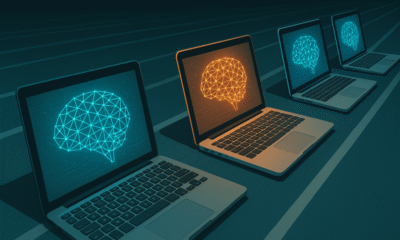Thought Leaders
How AI is Changing the Manufacturing Industry

According to the 2020 MIT Technology Review Insights survey, manufacturing is the sector with the second-highest adoption of artificial intelligence. This comes as no surprise since AI can shift the industry paradigm and reinvent how companies handle all aspects of the manufacturing process.
AI Isn’t Good At Everything, So Strategic Implementation is Key
Despite how it’s revolutionizing nearly every aspect of our lives, there are plenty of things that artificial intelligence cannot do as well as humans. For instance, while it is less prone to errors than the average person, it can still make mistakes.
Pre-programmed robots are excellent at completing repetitive tasks with virtually no oversight. However, it’s important to remember that humans must tightly control any degree of autonomy to mitigate potential problems. This is why, although driverless trains have existed for a while, the automobile industry struggles to implement autonomous vehicles. It’s much easier to control an autonomous train when it’s constrained by railways; the comparative freedom of roads currently leaves too much room for mistakes.
In the manufacturing industry, the tolerance for error is extremely low. This means that while AI can be leveraged to improve the way the sector operates, it must be done strategically alongside skilled human workers.
7 Ways AI is Changing Manufacturing
1. Predictive Maintenance
Before the advent of AI, machine maintenance was put on a strict schedule to minimize the risk of unexpected breakdowns. Now, companies can instead utilize predictive AI systems that can customize the maintenance needs of each piece of equipment, creating an optimized schedule for individual machines that boosts efficiency without increasing costs.
Milling facilities often have a problem of spindles frequently breaking, slowing production and inflating operating costs. However, by integrating AI programs into the software, these factories can maintain up-to-the-minute monitoring to detect potential failure points before they cause problems.
2. Quality Assurance
Using AI to augment quality assurance practices not only produces a better end result but helps organizations determine the optimal operating conditions for the floor and determine which variables are most important for achieving those goals. This lowers the rate of defects and also drastically minimizes the amount of waste generated, saving time and money.
McKinsey notes that the most expensive aspect of the semiconductor industry is manufacturing due to the long, multi-step production cycles that can take weeks or months. Much of this time cost is attributed to the QA tests that must happen at each step and the delays caused by defects.
AI not only streamlines these QA steps; it also improves overall efficiency and yield losses by aggregating data across all production phases.
3. Defect Inspection
It is now possible to “outsource” the work of finding imperfections thanks to AI’s ability to visually inspect items much faster and more thoroughly than humans can.
The right system can be trained on a relatively small number of images and then deployed to do the same work that typically takes dozens or hundreds of workers to complete. Additionally, it can conduct root cause analyses that allow companies to address underlying problems that may otherwise go unnoticed, increasing yield and optimizing production.
4. Warehouse Automation
Consumers are shifting their buying habits to e-commerce, which means warehouse efficiency is becoming a top priority for businesses that need excellent logistics to stay competitive.
Warehouse automation spans everything from implementing AI solutions that process invoices, product labels and vendor documents to leveraging algorithms to optimize shelving space, which can lead to massive ROIs in warehouse operations.
5. Assembly Line Integration and Optimization
It takes more than simply collecting data from the manufacturing floor to truly optimize production and lower costs. The information must be scanned, cleaned up and structured in a way that allows for functional analysis. AI can quickly and easily sort and structure the entire facility’s aggregated data to give personnel an actionable, practical overview of what’s happening at each stage of the production process.
This also allows for a certain level of assembly line automation, such as reorganizing production lines if a piece of machinery breaks down.
6. AI-based Product Development and Design
As the technology continues to advance and improve, artificial intelligence is expected to have the most significant impact on product development and design within the next five years. Manufacturers already use it for generative design to create innovative prototypes and speed up time-consuming tasks like meshing and geometry preparation.
Computer-aided development and design also help engineers create solutions that are outside of conventional thought, thanks to the training of AI programs. Not only are they capable of creating new ideas, but they can also reduce the number of simulations and prototypes needed before a viable product is made.
7. SME Utilization
The robotics industry is developing at a rapid pace, so AI-powered robots are becoming less of a novelty and more of an everyday part of life for many sectors. This is great news for small businesses because it means there is a wider pool of available options at more attainable price points. Previously, only giant corporations with the budgets to sink into R&D and cutting-edge technology could afford to make robots a part of their operations.
Also, teaching robots has become a simpler process that does not require a team of engineers for setup and maintenance. This means that small companies don’t have to hire a tech team to train and maintain robots.
Now, smaller manufacturers can reasonably invest in just a few small robots without using up their entire annual budget. This means their scaling capabilities will dramatically increase, allowing for faster expansion, more revenue growth and a more competitive edge against bigger players.
The Future of AI in Manufacturing
AI has the potential to significantly impact the manufacturing industry. While there are still challenges to overcome, such as the error-free integration of AI technology into existing systems and the need for specialized expertise, the potential benefits of AI in manufacturing are significant and likely to drive its continued adoption in the coming years.
Artificial intelligence will not replace traditional robots or eliminate the need for human workers. However, it can work alongside humans to scale operational processes faster and more efficiently, improving the bottom line.












